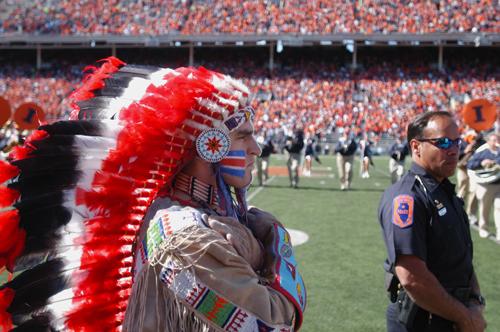Chief’s retirement benefits Illini athletics

Former University of Illinois mascot, The Chief, is still under scrutiny one year after its retirement. Erica Magda
Feb 21, 2008
Last updated on May 12, 2016 at 09:55 p.m.
Wayne Angel remembers the Chief fondly from his time as a runner at Illinois in the early 1980s. Angel said he enjoyed the tradition the Chief represented.
But now, as the head men’s track and field coach, Angel’s sentiments have changed.
“I definitely liked the Chief, but I’m for what’s best for the University,” Angel said Wednesday, one day before the one-year anniversary of the Chief’s final dance. “I’m an alum and I enjoyed the Chief and its history. But I want what’s best for this University and whatever the University decides what is best.”
The University’s decision to retire the former symbol may also be best for Angel’s squad. Men’s track and field joins the remainder of the University’s Division I athletic teams that have been able to host postseason events since the retiring of Chief Illiniwek. In May, the Illinois Soccer and Track Stadium will host the Big Ten Track and Field Outdoor Championships, an opportunity the team would have missed out on had the Chief been allowed to keep dancing.
Get The Daily Illini in your inbox!
“It says volumes in terms of being able to showcase our talents to the community that loves Illinois track,” Angel said about being able to host the championships. “We have some of the best athletes in America and it says a lot for the program and for the exposure of our athletes.”
In August of 2005, the NCAA banned the University from hosting any postseason events for harboring a mascot deemed “hostile and abusive.” On Feb. 15, 2007, the University was notified it would be allowed to host such events following the last dance on Feb. 21, 2007. Since then, the Division of Intercollegiate Athletics has shed the NCAA’s sanctions.
“We’re compliant (with NCAA regulations) and able to host,” Assistant Athletic Director Kent Brown said. “It allows our athletes to compete and pursue the highest level of competition.”
But for some teams, the change came too late.
The Illinois women’s soccer team finished its 2006 season as Big Ten runners-up and seeded third in its bracket heading into the NCAA Tournament. Such a seed usually guarantees home-field advantage until the third round of the 64-team tournament. Because of the sanctions handed down by the NCAA, though, head coach Janet Rayfield and her squad were forced to travel to St. Louis to compete.
Until their next opportunity, Rayfield can only imagine what that chance will be like.
“When you talk about players’ dreams of competing in the NCAA postseason, it’s a special moment when you can share that with the fans that support you,” Rayfield said. “Sending a team to the final four from Champaign is a vision we aspire to. That ability is important to us.”
The inability to compete at home during the playoffs also affected Rayfield’s ability to recruit, even more so than fronting a “hostile and abusive” mascot, she said.
“I think in the environment we recruit, the ability to host was the target factor players looked at,” Rayfield said. “Just like the normal community, the athletic community fell on both sides of the debate. It had more of an effect on the dream of playing at home.”
While Rayfield’s team just missed its chance, Brad Dancer’s squad just made it.
In the spring of 2007, the Illinois men’s tennis team hosted the first round of the NCAA Tournament. But for Coach Dancer, whose 2006 team also could have hosted if not for the sanctions, there are positives to being able to compete on the road.
“I hate to say this but more than anything else (travelling during the 2006 NCAA Tournament) created a unique experience for our guys,” Dancer said. “We went on the road to Louisville, we had buses that came down to support our team. To have that kind of support for an away match, I hate to say it but it was a student-athlete experience that I don’t think our guys will ever forget.”
Dancer, like Angel, said he understands the nostalgia of the Chief.
“Our guys I still think … they identify with the real positive, the power and the strength, if you will, of an almost mythological sense of what the Chief is,” he said. “In sports, and in life, I think it is very important to attach … a bigger meaning than yourself, and the Chief, for a lot of our athletic teams, I think, is something that stands for something bigger than them.”
Still, there are advantages to competing at home.
“We want to host, don’t get me wrong, we like to play at home, we like to sleep in our own beds, we like to have the home-court advantage, have our Net Nuts and everything else,” Dancer said.
Angel, along with Dancer and Rayfield, won’t have to worry about new sanctions any time soon, as Brown said both the name “Fighting Illini” and the continuation of the “Three-in-one” halftime band performance do not put the University out of compliance with the NCAA. That’s fine with Angel.
“It’s a big relief and burden lifted off our shoulders to be at home in a friendly environment,” he said. “It’s a great situation for us.”
Jim Shay contributed to this report





